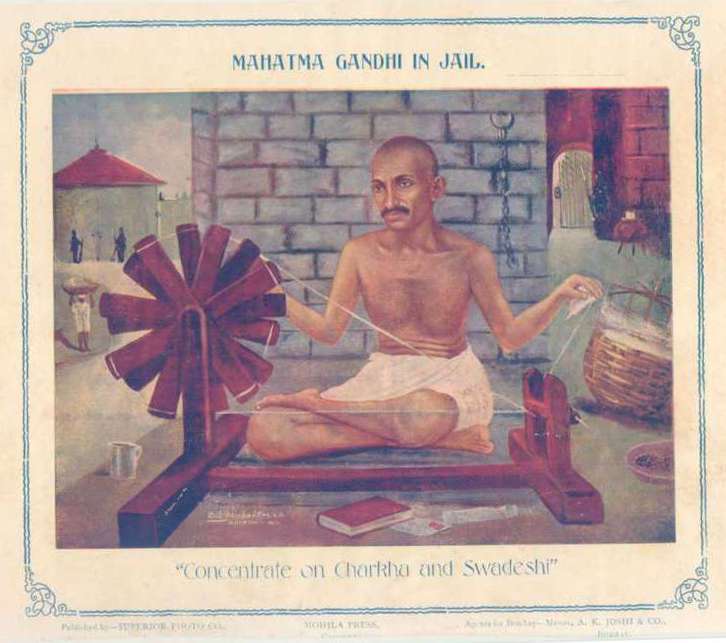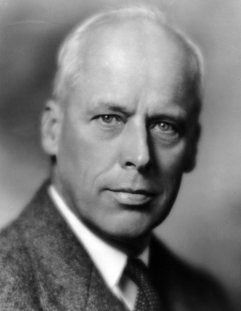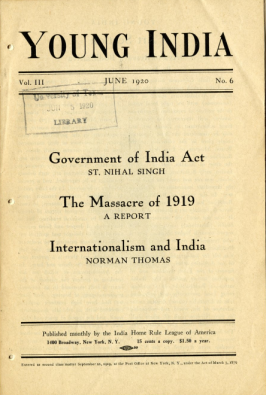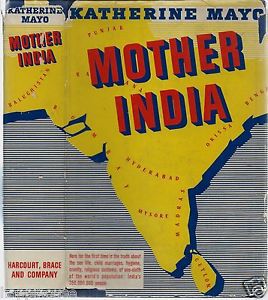
Caroline Preston
University of Exeter
Caroline Preston is in her final year of undergraduate study in History at the University of Exeter. This post stems from an essay written for the module ‘Critics of Empire.’
Many Indian nationalists in the 1920s were angered by the coercive British enforcement of free trade in India.[1] The policy was, according to one scholar, ‘thrust by an advanced industrialised country on a nation which still needed protective tariffs to develop’.[2] This same free trade imperial policy had resulted in an economic ‘drain’ as India had to export raw cotton and import manufactured cotton goods because India’s native industries were underdeveloped and thus uncompetitive in the global economy.[3] Mass nationalist politics picked up in colonial South Asia, first in Bengal in the Edwardian era, and then across India in the 1920s.[4] This included the self-determination ‘Swadeshi’ (indigenous goods) movement, which aimed to achieve ‘swaraj’ (home rule) by establishing India’s economic self-sufficiency from Britain.[5] Swadeshi was in certain respects an anti-colonial adaptation of German-American protectionist theorist Friedrich List’s (1789- 1846) concept of economic nationalism.[6]
Mahatma Gandhi led the Swadeshi movement in the 1920s, encouraging non-cooperation and the exclusive consumption of hand spun cloth called ‘khadi’ in order to develop domestic industries.[7] In response, the pro-India movement of the 1920s arose in the United States, a network of Indian and US intellectuals who hoped to mobilise the US government and the public to challenge British imperial policy.[8] They promoted Indian independence from British rule, or at least dominion status comparable to that of Canada.
 Norman Thomas
Norman Thomas
I’ve chosen two illustrative sources to explore the political economy of the pro-India movement in 1920s America. The first is an article by Norman Thomas, ‘Internationalism and India’ (June 1920) in Young India, a monthly magazine published in New York by the Indian Home Rule League of America (IHRL).[9] Thomas (1884- 1968) was an American Presbyterian minister, a pacifist, and an anti-imperialist.[10] He was a member of the Friends of Freedom for India (FFI), another key pro-India organisation.[11] Thomas was also a democratic socialist; he became formally affiliated with the American Socialist Party in 1918, and was its presidential nominee in 1928.[12] Murray Seidler has since described Thomas as the party’s ‘most influential theoretician’.[13] In the article, Thomas’s general argument was that, although he supported the Indian nationalist movement, once they obtained independence they should avoid enforcing a protectionist economic policy, believing such policies created geopolitical tensions that could eventually result in war. Instead, he advocated internationalism under a democratic socialist structure.
 Jabez T. Sunderland
Jabez T. Sunderland
The second source comprises of extracts from a chapter entitled ‘American Interest in India’ by the American liberal activist and Unitarian minister Dr Jabez Sunderland (1842- 1936). The chapter is from India in Bondage (1929), which, like Young India, was published in New York.[14] Sunderland was elected vice president of the IHRL in 1918.[15] Following the collapse of the IHRL and FFI in 1922, Sunderland again became active in the Pro-India Movement at the end of the decade, largely in response to Gandhi’s ongoing civil disobedience campaign.[16] Sunderland’s India in Bondage argued for Indian Home Rule, written partly in response to Pennsylvania journalist Katherine’s Mayo’s explicitly pro-imperialist book Mother India (1927).[17] This particular chapter explained why America held an interest in what was commonly perceived to be a local colonial issue for Britain. Here Sunderland focussed on economic factors; he suggested that Britain should relinquish its imperial control over India and enable Indians to enforce their own policy of free trade. He hoped this would reduce international tensions and provide opportunities for American businessmen.[18]
These two sources exemplify the confluence of socialist and liberal economic opinions within the movement, including the commonalities and shared values of free trade and democracy that enabled them to collaborate. Both Thomas and Sunderland also emphasised the threat of war as a key motive behind their economic arguments.
———-
 In ‘Internationalism in India’, Thomas showed support for Indian self-determination, and tried to reconcile Indian economic nationalist sentiments with his own internationalism. He well-recognised that the Indian people felt inclined to move towards their own protectionist policies in retaliation to British free-trade imperial exploitation. He accepted that ‘lovers of liberty in countries like Ireland, India and Egypt find themselves driven to think in terms of an intense nationalism’ as a way of ‘freedom from economic and political imperialism’.[19] Thomas was sympathetic to the economic nationalist activities of Gandhi and the Swadeshi movement. Thomas referred to Gandhi’s ‘movement of Satyagraha’, which involved using non-violence (including Swadeshi) to effectuate political change.[20]
In ‘Internationalism in India’, Thomas showed support for Indian self-determination, and tried to reconcile Indian economic nationalist sentiments with his own internationalism. He well-recognised that the Indian people felt inclined to move towards their own protectionist policies in retaliation to British free-trade imperial exploitation. He accepted that ‘lovers of liberty in countries like Ireland, India and Egypt find themselves driven to think in terms of an intense nationalism’ as a way of ‘freedom from economic and political imperialism’.[19] Thomas was sympathetic to the economic nationalist activities of Gandhi and the Swadeshi movement. Thomas referred to Gandhi’s ‘movement of Satyagraha’, which involved using non-violence (including Swadeshi) to effectuate political change.[20]
However, Thomas hoped that this protectionist policy would not be the ultimate aim for a self-determined Indian economy. As evident in ‘Internationalism and India’, he believed that conflict was a result of the ‘nationalist capitalist system’.[21] Thomas warned that ‘so long as every state desires to be self-sufficient in a world of unfriendly rivals, we shall have no peace’.[22] Therefore, whilst Thomas deeply empathised with the nationalists, he was concerned that a protective policy of economic nationalism would cause geopolitical tensions. Young India was read by both Indian and American members of the IHRL and was available to the general public. [23] Thomas may therefore have hoped to convey his anti-protectionist message to Indian nationalists advocating Swadeshi. Furthermore, there was increasing protectionist sentiment among the great powers following the First World War, and so Thomas may also have intended to deter Americans from their protectionist path.[24]
 Sunderland, like Thomas, connected economics with colonialism and war. This should not be surprising, considering that, as Raucher points out, many American pro-India activists tended ‘to follow the arguments of British leftist John A. Hobson that economic imperialism provoked wars among great rival powers’.[25] Sunderland therefore emphasised his concerns about the threat of war after the war for his Indian and American readership. He ‘directly or indirectly’ attributed British wars ‘of the past hundred years’ to Britain’s possession of India.[26] He described how other great powers had become envious, resulting in an ‘imperialistic… anti-democratic… aristocratic’ spirit ‘steadily growing’, which he connected to militarism. [27] Therefore, Sunderland saw imperial competition for economic gain as an impediment to world peace.
Sunderland, like Thomas, connected economics with colonialism and war. This should not be surprising, considering that, as Raucher points out, many American pro-India activists tended ‘to follow the arguments of British leftist John A. Hobson that economic imperialism provoked wars among great rival powers’.[25] Sunderland therefore emphasised his concerns about the threat of war after the war for his Indian and American readership. He ‘directly or indirectly’ attributed British wars ‘of the past hundred years’ to Britain’s possession of India.[26] He described how other great powers had become envious, resulting in an ‘imperialistic… anti-democratic… aristocratic’ spirit ‘steadily growing’, which he connected to militarism. [27] Therefore, Sunderland saw imperial competition for economic gain as an impediment to world peace.
Sunderland also argued that if the colonised nations such as India were not granted Home Rule, they may violently rise up in protest ‘and the war may spread no one knows how far’. [28] Writing after the First World War when there was a general pessimism and fear about the future prospects of civilisation, Sunderland may have emphasised this threat in order to give his arguments broader appeal.[29] Sunderland’s arguments even gained circulation in India. By May 1929 over 1,400 copies of the Calcutta edition had been sold.[30] The book was also heavily suppressed by the British authorities, as reported in the Manchester Guardian, suggesting that it was influential enough to be deemed a threat.[31]
Both Thomas and Sunderland therefore connected the threat of war after the Great War with economic nationalism and imperialism. Despite being driven by slightly different liberal or socialist values, Sunderland and Thomas were able to work closely together because they shared the aim of promoting economic interdependence in a decolonised India. Thomas fully recognised the flaws of ‘internationalism’ when it was ‘subverted to base ends’ as a ‘cloak for imperialism’, implying that this was the current problem with British free trade imperialism in India.[32] However, he was adamant that a ‘true’ form of internationalism would ultimately bring world peace and prosperity.[33] He advocated national self- determination to be conjoined with internationalism in a federation of democratically free peoples.[34] Rather than an ‘establishment of Asiatic capitalism’, Thomas hoped for the ‘reassertion of the principle of cooperation… by an appeal to the common interests of the workers the world around’.[35] He called for an independent India to implement a policy of democratic control and public ownership and to freely establish economic interdependence with other nations.[36]
This emphasis on the interests of workers, rather than a focus on private business, was in line with Thomas’s socialist values. This differed from Karl Marx’s argument for free trade, who was sceptical that market interconnectivity would lead to fraternity of nations; Marx was more focussed on how free trade might unite the proletariat in order to lead the way to revolution. However, as Seidler commented, Thomas was keen to emphasise that Marxism was not ‘coterminous’ with socialism and he did not advocate a revolution.[37] Rather, he hoped for free trade to facilitate world peace. This connection was remarkably similar to that made by contemporary British Manchester School liberal peace activists such as Hobson and Norman Angell, the ideological heirs of Richard Cobden (1804- 1865), one of the foundational Victorian proponents of free trade as a prerequisite for peace.[38]
Sunderland also advocated for free trade in Home Rule India. He argued that Indian Home Rule would enable American businessmen to access lucrative markets. This was exemplified in his point that ‘India held in subjection by Great Britain works much injustice to the USA’ because they had ‘a right to…free and unobstructed… commercial and industrial…intercourse’ with India.[39] They could not have this ‘with her controlled by any foreign power’.[40] Sunderland clarified that despite Britain offering India an ‘open door’ to all nations, this was ‘only technical’ as the British government still controlled ‘all avenues of commerce’ in order to have ‘advantages over all other nations’.[41] He noted that, ‘when our American businessmen want any consular service in connection with India, they are compelled to go to British consuls…representatives…of (India’s) foreign oppressors’.[42] Sunderland instead advocated that India’s ‘great market’ be opened up to all nations as ‘we and all the rest of the world have an interest’ in India’s resources.[43] Therefore, Sunderland advocated for liberalisation of trade for a self-determined India as the solution. This view was revisited later in the book when Sunderland claimed that war could have been avoided ‘if Britain had (listened to the views of) noble Englishmen like John Bright and Herbert Spencer and John Stuart Mill’, all advocates of free trade internationalism.[44]
Therefore, these similarities in terms of promoting free trade in India meant that their liberal or socialist views were not considered to be inherently antagonistic. This was exemplified by the fact that directly underneath Thomas’s Young India article, a piece by Sunderland himself was published.[45] Indeed, Seidler argued that the popular identification of Thomas with organised socialism tended to obscure the degree to which he closely collaborated with ‘eminent leaders of American liberalism’ such as the pro-India advocates and co-founders of the National Association for the Advancement of Coloured People, Oswald Garrison Villard, the owner of the American progressive magazine The Nation, and John Haynes Holmes, a prominent Unitarian minister and pacifist.[46]
As the earlier vice president of the IHRL, Sunderland was aware of the Swadeshi movement, especially considering that the IHRL was closely tied to Gandhi.[47] Also, Sunderland referred to Gandhi’s arguments for self-determination in his book.[48] However, as Raucher has noted, many Americans assumed that an independent India would ‘welcome badly needed…financial investments’.[49] Therefore, Sunderland may have believed that Indian nationalists would stop promoting protectionist policies and open themselves up to American trade and investment once they gained Home Rule.
 Katherine Mayo, Mother India (1927).
Katherine Mayo, Mother India (1927).
On the surface, one might conclude that Sunderland appears to have been more focussed on using India’s lucrative resources to build up the American economy than prioritising the growth of Indian industries. [50] However, Sunderland was writing during a time when there was support for pro-British imperial arguments such as Mother India.[51] Therefore, his emphasis on the ‘inconveniences and injustices’ facing American businessmen may have been targeted at those in positions of power, in business or politics, who he hoped would endorse the movement.[52] The book certainly made an impact in America; more than 5,000 copies of the first edition were sold and it was discussed in the New York Times.[53] This implies that there was more than a little curiosity about Sunderland’s controversial argument.
Thomas and Sunderland both emphasised the crucial need for democracy and self-determination as a precondition to their economic ideas. Raucher has noted that they were writing during a period of increasing ‘anti-democratic, and pro-fascist elements’ at home and the rise of ‘the authoritarian systems’ abroad. [54] This led some American intellectuals to see a ‘new urgency for defending democracy’.[55] Thomas expressed his desire that ‘Mr. Gandhi show the way to the West’ through the advancement of democracy in India, and James Duram has corroborated that Thomas was concerned by the rise of fascism in Europe. [56] Similarly, Teed has argued that Sunderland hoped to ‘provide an antidote’ to America’s own cultural decline.[57] In the book, Sunderland voiced his fear that ‘in America, some are speaking lightly of democracy…who look with… favour upon Mussolini’.[58] Therefore, both may have impressed the importance of an economic policy built upon democracy in response to these concerns.
———-
On balance, ‘Internationalism and India’ and India in Bondage demonstrate that economic ideas about free trade, established by a self-determined nation, were important to the pro-India movement in 1920s America. In spite of the protectionist sentiments promoted within the ‘Swadeshi’ movement itself, both Sunderland and Thomas perceived the spread of economic nationalism after the Great War to be a threat to world peace. Consequently, despite Thomas’s support for democratic socialism and Sunderland’s more radical liberal views, the two were able to collaborate based on their support of free trade and democracy in an independent India.
———-
[1] P. Harnetty, ‘The Imperialism of Free Trade: Lancashire, India, and the Cotton Supply Question, 1861- 1865’, Journal of British Studies 6, 1, (Nov, 1966), 70-96; A. Redford, Manchester Merchants and Foreign Trade, 1850- 1939, (Manchester, 1956), pp. 21- 32; R. J. Moore, ‘Imperialism and “Free Trade” Policy in India, 1853-4’, The Economic History Review 17, 1, (1964), 135- 145.
[2] S. Bhattacharya, ‘Cotton Mills and Spinning Wheels: Swadeshi and the Indian Capitalist Class, 1920- 22’, Economic and Political Weekly 11, (Nov, 1976), 1828.
[3] Ibid.
[4] S. Sarkar, The Swadeshi Movement in Bengal, 1903-1908 (New Delhi, 1973); A. Sartori, ‘The Categorical Logic of Colonial Nationalism: Swadeshi Bengal, 1904-1908,’ Comparative Studies of South Asia, Africa and the Middle East 23 (2003): 271-285; I. Klein, ‘Indian Nationalism and Anti‐Industrialization: The Roots of Gandhian Economics’, South Asia: Journal of South Asian Studies, Vol. 3, No. 1. (1973), 101; L. N. Trivedi, ‘Visually Mapping the “Nation”: Swadeshi Politics in Nationalist India, 1920- 1930’, The Journal of Asian Studies 62, (Feb. 2003), 11.
[5] Ibid.
[6] D. Levi- Faur, ‘Friedrich List and the Political Economy of the Nation- State’, Review of International Political Economy 4, (Spring, 1997), 155; M. Goswami, Producing India: From Colonial Economy to National Space, (Chicago, 2004), p. 215.
[7] Ibid; Bhattacharya, ‘Cotton Mills and Spinning Wheels’, 1828.
[8] A. Raucher, ‘American Anti-Imperialists and the Pro-India Movement, 1900- 1932’, Pacific Historical Review 43, (Feb. 1974), 83; 90.
[9] N. Thomas, ‘Internationalism and India’, Young India 3, (New York, Jun. 1920), 138- 140.
[10] Raucher, ‘American Anti-Imperialists’, 97; N. H. Bukowski and M. Dickstein. ‘Tribune of Socialism: Norman Thomas (1976)’, in N. Howe (ed.), A Voice Still Heard: Selected Essays of Irving Howe, (London, 2014), p.178; J. C. Duram, ‘In Defense of Conscience: Norman Thomas as an Exponent of Christian Pacifism During World War I’, Journal of Presbyterian History (1962- 1985) 52, (Spring, 1974), 19.
[11] Raucher, ‘American Anti-Imperialists’, 94-95, 97.
[12] Bukowski and Dickstein. ‘Tribune of Socialism’, p. 178.
[13] M. Seidler, ‘The Social Theory of Norman Thomas’, The Southwestern Social Science Quarterly 38, (March, 1958), 357.
[14] J. T. Sunderland, India in Bondage: Her Right to Freedom and a Place Among the Great Nations, (New York, 1929), pp. 24- 29, 34.
[15] Raucher, ‘American Anti-Imperialists’, 86; E. Manela, The Wilsonian Movement: Self Determinism and the International Origins of Anti-colonial Nationalism, (Oxford, 2007), p.87.
[16] Ibid.
[17] P. Teed, ‘Race Against Memory: Katherine Mayo, Jabez Sunderland and Indian Independence’, American Studies 44, (2003), 35.
[18] Sunderland, India in Bondage, p.29.
[19] Thomas, ‘Internationalism and India’, 139.
[20] Thomas, ‘Internationalism and India’, 140; M.K. Gandhi, Satyagraha: Non-Violent Resistance, (Ahmedabad, 1958), p. 37.
[21] Thomas, ‘Internationalism and India’, 139. This point is stated even more clearly in N. Thomas, War: No Glory, No Profit, No Need, (New York, 1935), p. 167.
[22] Thomas, ‘Internationalism and India’, 139.
[23] Raucher, ‘American Anti- Imperialists’, 94.
[24] W. R. Garside, ‘Party Politics, Political Economy and British Protectionism, 1919-1932’, History 83 (Jan. 1998), 47.
[25] Raucher, ‘American Anti- Imperialists’, 94.
[26] Sunderland, India in Bondage, p. 25.
[27] Ibid. p. 35.
[28] Sunderland, India in Bondage, p.27.
[29] L. M. Ashworth, ‘Democratic Socialism and International Thought in Interwar Britain’, in I. Hall (ed.), Radicals and Reactionaries in Twentieth Century International Thought, (New York, 2015), p. 78.
[30] Teed, ‘Race Against Memory’, 53.
[31] Ibid, 51- 52; The Manchester Guardian, 30 Sep. 1929.
[32] Thomas, ‘Internationalism and India’, 138- 139.
[33] Ibid. 139.
[34] Raucher, ‘American Anti-Imperialists’, 97.
[35] Thomas, ‘Internationalism and India’, 140.
[36] Seidler, ‘The Social Theory’, 368.
[37] Seidler, ‘The Social Theory’, 365, 368
[38] P. Cain, ‘Capitalism, War and Internationalism in the Thought of Richard Cobden’, British Journal of International Studies, 5, (Oct, 1979), 229; P. Cain, ‘J. A. Hobson, Cobdenism, and the Radical Theory of Economic Imperialism, 1898- 1914’, The Economic History Review, 31, (Nov. 1978), 565- 566; J. Heilbrunn, ‘The Case for Norman Angell’, The National Interest 127, (Sep/ Oct, 2013), 38.
[39] Sunderland, India in Bondage, p.27.
[40] Ibid.
[41] Garside, ‘Party Politics’, 47; Sunderland, India in Bondage, p.28.
[42] Sunderland, India in Bondage, p.29.
[43] Ibid.
[44] Ibid. p.405.
[45] J. T. Sunderland, ‘India Against Foreign Rule’, Young India, 3, (New York, Jun. 1920), 140- 142.
[46] Seidler, ‘The Social Theory’, 360- 361. Despite being commonly depicted as predominantly liberal, socialists were key members of the pro-India movement; the FFI was led by Agnes Smedley who had joined the Socialist Party of America in 1916. See Raucher, ‘American Anti- Imperialists’, 96.
[47] Ibid, 101.
[48] Sunderland, India in Bondage, p.27.
[49] Raucher, ‘American Anti-Imperialists’, 107.
[50] Sunderland, India in Bondage, p.29.
[51] Teed, ‘Race Against Memory’, 51- 52.
[52] Sunderland, India in Bondage, p.29; Raucher, ‘American Anti-Imperialists’, 104.
[53] Teed, ‘Race Against Memory’, 53; New York Times, 5 Jan. 1930.
[54] Raucher, ‘American Anti- Imperialists’, 101.
[55] Ibid.
[56] Thomas, ‘Internationalism and India’, 140; J. C. Duram, ‘Norman Thomas as Presidential Conscience’, Presidential Studies Quarterly, 20, (Summer, 1990), 585. Raucher, ‘American Anti- Imperialists’, 101.
[57] Teed, ‘Race Against Memory’, 49.
[58] Sunderland, India in Bondage, p.34.
Share this:- More





